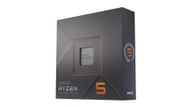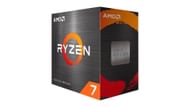The AMD Ryzen 5 7600X and the Ryzen 7 5800X are some lucrative options in the mid-range. These chips have been discounted well below their $300+ launch prices following the introduction of newer Zen 5 processors. That said, they still bundle enough performance to handle most workloads and high-end graphics cards without a hiccup.
There are quite a few differences between the chips, such as the 7600X being the newer processor on a platform as compared to the 5800X, which is locked to the older DDR4-based AM4 platform.
Be that as it may, given they're both selling at cheap prices, which one should you buy in 2025? Let's dissect the processors and try to find an answer.
The AMD Ryzen 5 7600X and Ryzen 7 5800X are powerful gaming CPUs, albeit with some caveats

The AMD Ryzen 5 7600X was significantly improved as compared to older six-core chips from Team Red. It features a 105W TDP, unlike the 65W design the 3600X and 5600X shipped with, alongside high operating clock speeds of up to 5.3 GHz.
The move to a new platform, AM5, with DDR5 exclusivity also made the chip costlier. However, the extra single-core performance and future upgradability justified the price for it in 2022.
Looking back, these promises have positioned the 7600X well in the market, with the chip working well with all modern motherboards and cooler releases. That isn't the case with the older 5800X.
The 5800X is also based on a similar 105W design. Its boost speeds are significantly slower, though, topping out at 4.7 GHz.
It is based on the dead-end AM4 platform. While it lasted from 2017-2024, AMD has confirmed that no new PGA chips will be launched. DDR4 prices are also on the rise as most manufacturers near the end of life, with most production ending by 2024. In a sense, you'll be signing up for a product whose support gets worse with time.
Specs comparison
Zen 4 was a significant improvement in how Ryzen processors are designed. While the 7600X and 5800X maintain the core count delimitations (six on the Ryzen 5 and eight on the 7), the cache has been significantly boosted (32 MB L3 on both) alongside PCIe Gen 5.0 support with 28 PCIe lanes.
Moreover, the 7600X also ships with a dual-core integrated Radeon graphics chip.
The detailed specs of the processors are as follows:
Essentially, both chips are priced the same at $170. You can get the slightly slower 5800XT at $160. This makes choosing among them difficult, given the Ryzen 7's extra cores. Let's look at the performance of either processor.
Performance comparison

In terms of synthetic performance, the Ryzen 5 7600X and 5800X have a few differences. The 7600X is 19% faster in terms of single-core performance, which translates to gaming capabilities.
That said, the multi-core scores in Cinebench R23 are nearly identical, which nullifies the argument of gains with the extra two cores on the Ryzen 7. This is particularly because of gen-on-gen improvements with Zen 4.
In gaming performance, the gains with the newer chip are seen extensively, across games and engines. When tested with an RTX 4090, which eliminates graphics bottleneck possibilities, the 7600X delivers much better framerates.
Here are some framerate numbers, sourced from the YouTube channel Hardware for Gamers.
The 7600X consistently outperforms the Ryzen 7 5800X in GPU-bound video games. This is particularly because of the extra single-core performance on the Zen 4 chip. Even in CPU-bound titles such as Mountain & Blade II Bannerlord, the Ryzen 5 7600X maintains a slight lead over the 5800X at both 1080p and 1440p.
Given that the prices of the Ryzen 5 7600X and the 5800X are about the same, we recommend choosing the newer processor. This ensures you get a newer DDR5 system with room for upgradability and no bottlenecks, even if you pair a high-end GPU with your rig.
